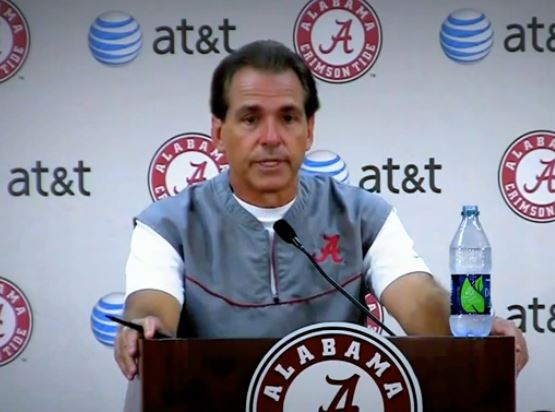The never-ending evolution of football schemes has resulted in more points lighting up the scoreboard than ever before. These days, however, it seems like some of the biggest battles in the sport are occurring off the field. College football has never been more popular in this country, and the sport’s rise in prominence has coincided with an increase in offensive firepower.
Gone are the days of “three yards and a cloud of dust” football, instead replaced with video game-style offensive numbers and defensive coordinators who are happy to give up only 28 points in a game. The business of college football in America is undergoing a huge practical and philosophical shift, and like any other business, there are always those who resist changes.
Alabama’s Nick Saban became the face of that increasing minority in the coaching community when he asked the now famous question: “Is this what we want football to be?” Believe it or not, this statement was actually made less than two weeks BEFORE Johnny Manziel and Texas A&M came into Tuscaloosa and shocked the world in the biggest upset of the year.
Earlier this month, the NCAA rejected a proposal that would have slowed down offenses all around the country, and would have literally given a “delay of game” penalty for snapping the ball too quickly. The ten-second rule, unofficially dubbed the ‘Saban Rule’ by South Carolina Head Football Coach and professional golf hustler Steve Spurrier, would’ve penalized an offense that snapped the ball without giving the defense 10 seconds to substitute personnel, whether or not the offense substituted in between plays (Saban has denied having anything to do with the proposal, which was confirmed by Rogers Redding, NCAA coordinator of officiating).
The reasons given for the proposed rule change mostly had to do with “player safety,” The idea being that up-tempo offenses have somehow increased the number of injuries on the field. Arkansas head coach Bret Bielema even used the example of Cal defensive end Ted Agu, who, in February this year, collapsed during a conditioning run and later died.
When asked what evidence he had that up tempo offenses posed a greater risk for players, Bielema answered, “death certificates.” This was shortly after the Agu incident, and Bielema later apologized for the remarks. Then again, coaches like Saban and Bielema have yet to explain how going fast on offense is harmful to players, but lining up and running the ball up the gut in what some would describe as “smashmouth football” is not.
Poor word choices aside, the issue here isn’t that a lot of (almost exclusively) old school coaches don’t like the way the game is changing, it is rather the idea that instead of competing and getting better, they can simply change the rules to protect themselves and their teams. Even if these coaches are completely genuine in their belief that up-tempo offenses are dangerous to players, the bottom line is that there is not, and likely never will be any legitimate evidence to back that up.
The attempted power grab earlier this month by some of the old brass in college football amounts to a last-ditch desperation move by those who have refused, or are simply unable, to adapt. Even the NFL, which for a long time had been the lone holdout in the football world of “old-school” styles of football, has begun to see teams such as Washington, San Fransico, Carolina, and yes, Philadelphia adapt the spread, up-tempo option attack to the professional game.
Of course, this is in addition to the up-tempo attacks that guys such as Peyton Manning, Tom Brady and Drew Brees have been terrorizing opponent’s defenses with for years. If no-huddle offenses increased injuries, you could make the argument that Peyton Manning should have racked up quite the body count by this point in his career.
After the failure of this latest proposal, this much is clear: college football has changed, and it’s never going back to the way things used to be. For those who love the game, including Ducks fans, that’s a beautiful thing.
Top Photo: captured from video
Related Articles:
Seven Offensive Coordinator Candidates for the Oregon Ducks
Five Candidates to Replace OC Marcus Arroyo
Coach Jim Mastro: The Perception, and the Truth
Has Oregon Turned the Corner on Offense?
Ducks, Taggart Punish Beavers; Earn Bowling Trip
Textbook Defense, Herbert's Return Energize Duck Victory; Civil War Next
Alex Kirby (Writer and Football Analyst) worked several seasons as an assistant football coach at the high school and college levels and is the author of Speed Kills: Breaking Down the Chip Kelly Offense, now available HERE.



